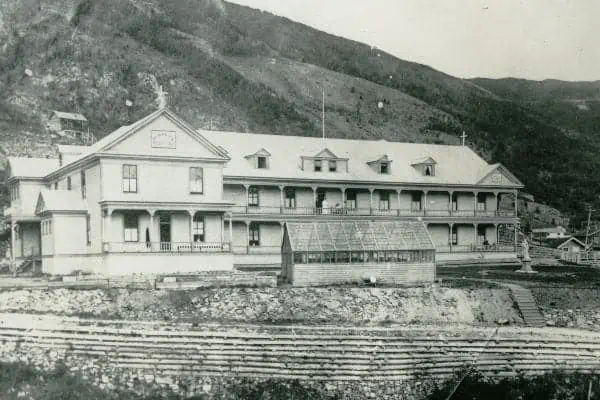The discovery of long-buried human remains in Dawson City two years ago shone a public spotlight on a little-known chapter in Yukon history.
The four bodies unearthed at the site of a former Northwest Mounted Police palisade turned out to be those of prisoners executed and secretly buried during the Klondike Gold Rush.
Two of them were later identified as Jim and Dawson Nantuck, young members of the Carcross-Tagish First Nation, who were hanged on August 4, 1899.
Whitehorse journalist and playwright Leonard Linklater first encountered their story in 1996, when he was at the Institute of Indigenous Government in Vancouver studying the report of the Royal Commission on Aboriginal Peoples.
That report maintained that the Canadian judicial system had been unfair to First Nations since its creation. The research included a journal of essays on legal history.
“One of the stories was the Nantuck brothers, and the essay was basically an argument that they were hung and killed through a judicial homicide, they called it.”
Despite being born and raised in the territory, Linklater was not familiar with Nantuck name.
“I had spent at least 15 years in journalism and I had never heard of the story,” he says. “It was lost history as far as I was concerned.”
That lost story forms the basis of Linklater’s new play, Justice, which begins a Yukon community tour this week in a Gwaandak Theatre production directed by Cree playwright-actor-director Floyd Favel.
There were actually four Nantuck brothers sentenced to hang for shooting two prospectors on the M’Clintock River in May, 1898. The other two, Joe and Frank, died in police custody of scurvy and tuberculosis.
“They were likely not brothers through blood, but clan brothers, basically. They were members of the Ganaxteti clan, which is part of the Crow moiety. I’m not sure where the Nantuck name comes from, or where it’s gone.”
The shootings were part of a chain of events that began when two members of the Nantucks’ clan died of accidental poisoning.
“They found this can of white powder, and thinking it was baking powder, they made some bread,” Linklater explains.
“They had a dog there, so they fed the dog some and it seemed OK. And this old guy and young boy start eating, and then the dog dies and they die soon after.”
The powder turned out to be arsenic, used by prospectors in processing gold.
After a traditional period of mourning, the Nantucks were assigned to “collect” on the deaths on behalf of their clan. They came across two prospectors named Meehan and Fox, who were building a boat on the M’Clintock River.
“There are a number of traditional protocols that need to be followed, and one of those is that the offending clan usually approaches the clan that’s been offended,” Linklater explains.
“Through my research, I see that they believed the white clan was responsible, so they see these guys as representatives of the white clan.”
When the prospectors didn’t respond, the Nantucks began collecting by taking some of their supplies.
“Long story short, the brothers didn’t feel by the time the boat was done that the debt had been paid, and when the prospectors left, they ended up shooting them. One died, one was wounded.”
Soon after a police began, the brothers gave themselves up. After a trial in Dawson City that lasted about half a day, they were convicted and sentenced to hang.
With the play, Linklater hopes to stimulate discussion among both native and non-native communities about the lingering questions over the conflicting cultural assumptions underlying the Nantuck case.
“They were practising their traditional justice. They were actually sent out as representatives of their clan because they had been done a wrong, and they were righting that wrong as far as they were concerned.”
The Gwaandak production of Justice will be in Teslin (September 26), Carcross (September 27), Haines Junction (October 2) and Dawson City (October 4) before moving to the Yukon Arts Centre for a four-night run October 10-13 at 8 p.m.
The four-person cast features Rob Hunter, Chris McGregor, Phillip Nugent and Corey Payette.




